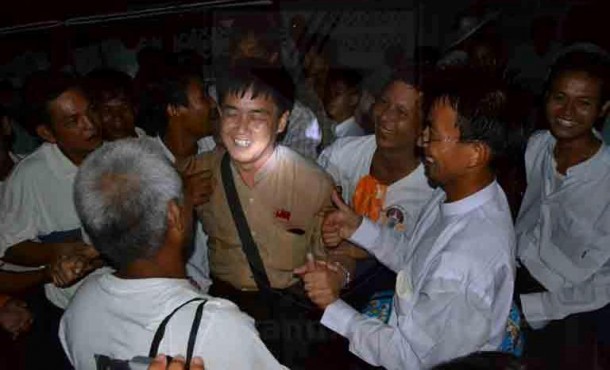RANGOON—Burma’s limited release of political prisoners shows the government is insincere in its much-lauded democratic reforms and is using its hundreds of detainees to gain further concessions by Western nations, activists said on Tuesday.
The latest amnesty announced on Monday covers more than 500 prisoners, but less than one-fifth are political detainees. Opposition groups and rights activists say Burma still holds several hundred political prisoners.
“I am not happy because other colleagues remain in prison. The government should release all political prisoners,” said Nyan Tun, a farmer from delta who was freed from Tharawaddy Prison.
The main opposition National League for Democracy party led by Aung San Suu Kyi said it confirmed at least 87 political detainees were among the 514 prisoners granted amnesty. Other groups tracking prisoners gave similar totals, based on information from the freed prisoners, their comrades and their families.
Voice of America reported on Wednesday morning that 99 political prisoners had been freed—the highest total so far—although this cannot yet be independently confirmed.
The latest amnesty came a week before reformist President Thein Sein is to travel to New York to attend the UN General Assembly, where he will be able to tout his reforms on an international stage.
“All political prisoner releases are good news, but until there is independent monitoring of Burma’s prisons, it won’t be known how many political prisoners still remain behind bars,” said Phil Robertson, deputy Asia director at Human Rights Watch (HRW). “Donor governments need to press President Thein Sein in New York to release all political prisoners and allow international monitors into the prisons.”
Thein Sein’s government has made freedom for political prisoners a centerpiece of its reform policies, which come after almost five decades of military rule ended last year. Western nations have eased their crippling economic and diplomatic sanctions in response, but Burma hopes for an end to the sanctions entirely to kick-start the country’s moribund economy.
The Information Ministry said the prisoners were released so they can participate in nation-building and to help maintain friendly ties with neighboring countries. A prison department official contacted by phone on Tuesday confirmed that 399 foreigners were freed under the amnesty.
The official was not authorized to speak to the media and spoke on condition of anonymity. Thailand’s Foreign Ministry said in a statement 83 of those released are Thais who were arrested this year for border encroachment.
“I think political prisoners are bargaining chips for Thein Sein’s policies,” said Bo Kyi, joint-secretary of the Thailand-based Assistance Association for Political Prisoners (Burma).
He added if Thein Sein was sincere in his desire for reform and reconciliation, his government needs to officially acknowledge it holds political prisoners and free them unconditionally. Burma has long insisted all prisoners it holds are criminals.
Meanwhile, HRW urged the Burmese government to end persecution of and provide support for released political prisoners.
The Ministry of Home Affairs has refused to issue passports to many released political prisoners, including democracy and human rights activists, public interest lawyers and journalists. Freed dissidents have also been denied the ability to resume their university studies, and released prisoners continue to lack adequate psychosocial support for the torture, mistreatment, and trauma associated with years—and in some cases decades—of imprisonment.
“Burma’s political prisoners find that when they are freed they are still not really free,” added Robertson. “The authorities should drop all restrictions on their movement and education, and help them rebuild the lives that the government has so cruelly and unjustly deprived them of.”















